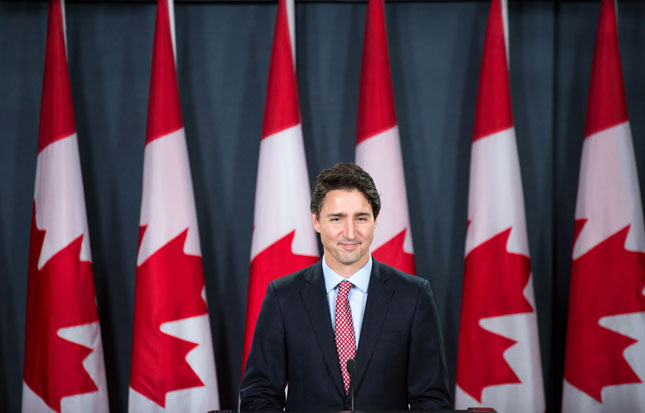-
Trudeau’s White House Visit Sets Stage for U.S.-Canada Climate Cooperation
March 10, 2016 By Schuyler Null
Canadian Prime Minister Justin Trudeau visits the White House this week and climate change is expected to be one of the highest profile topics of conversation.
Update: The White House released a joint statement with more detail on many of these priorities, including mention of cooperation through the G7 task force on climate change and security:
Recognizing the particular impact of climate change on countries already dealing with conflict and fragility, the leaders commit to addressing the intersection of climate change and security as an issue for foreign, defense, and development policies. Through the G7 working group on climate and security and elsewhere, both sides will work together to support sound analysis, practical recommendations, and meaningful cooperation to address climate-fragility risks.
Canadian Prime Minister Justin Trudeau visits the White House this week and climate change is expected to be one of the highest profile topics of conversation.
Reversing his predecessor Stephen Harper’s more conservative stances on environmental issues and Canada’s role in climate negotiations (Canada became the first signatory to pull out of the Kyoto protocol in 2011) was an important part of Trudeau’s bid to become prime minister.
Now in office, he’s moved quickly to signal a change. “To fight climate change, we’re all in this together. Canada is back,” Trudeau tweeted from the international climate negotiations in Paris last December.
“There is a nice alignment between a Canadian prime minister who wants to get all sorts of things done right off the bat and an American president who is thinking about the legacy he is going to leave in his last year in office,” Trudeau told The Huffington Post.
U.S. Special Envoy for Climate Change Todd Stern highlighted three specific areas for discussion between the two leaders this week:
- Maintaining momentum from Paris to address climate change through the UN Framework Convention on Climate Change
- A change to the 1989 Montreal Protocol to further restrict hydrofluorocarbons
- Building an international “market-based” means to make international aviation emissions neutral by 2020
Improved Canadian-U.S. relations around climate change could be important for a host of other reasons as well.
Imported Canadian hydropower, particularly from Quebec, could be an important way for U.S. states to reduce emissions under the Clean Power Plan (court challenges pending), writes the Canada Institute’s Andrew Finn. Eastern Canada, already a hydro powerhouse, is expected to see an increase in capacity in a warming world. If regulatory hurdles are cleared, hydropower imports could make it easier for U.S. border states to meet their climate targets.
Canada could bring new energy to G7 efforts to address climate fragilityInternationally, the United States has taken over chairmanship of the Arctic Council from Canada. The priorities outlined by the United States so far follow the same themes outlined by Canada previously, with human development, climate change adaptation, and environmental protection rising to the fore.
Canada could also play a larger role in the newly established G7 task force on climate fragility risks. At last year’s Group of Seven meeting in Germany, the foreign ministers endorsed a report they commissioned from an international consortium of research organizations, including the Wilson Center, A New Climate for Peace, on climate-related security and stability issues. G7 foreign ministers next come together this April in Japan, and Canada has an opportunity to bring new energy to the initiative.
“Canada has a long history of bringing environmental issues into wider human security, development, and humanitarian efforts,” says Ohio University Director of Environmental Studies and ECSP Senior Advisor Geoff Dabelko. “The recent reengagement on climate policy provides an excellent opportunity to advance efforts to address these interconnected compound risks where climate change is a growing concern.”
Trudeau’s ability to provide federal climate leadership, however, depends on reaching accommodation with the provinces, which have constitutional authority over Canadian resource policy. Wilson Center Scholar Barry Rabe writes that this “climate federalism” could serve as a model for governments around the world trying to balance the short-term costs of climate policy with tangible benefits.
The system has not worked for everyone, writes Anthony Speca for the Wilson Center’s Polar Initiative. Nunavut, home to extensive mineral, oil, and gas reserves that are becoming more viable as the Arctic warms, has the worst human development indicators in the country. “This is a moral failure as much as a political or economic one,” writes Speca. The territory needs more attention from the federal government befitting its place as a “full partner in Canadian Confederation.”
Sources: Government of Canada, The Huffington Post, Twitter, U.S. Department of State, The White House.
Photo Credit: Prime Minister-designate Justin Trudeau speaks to press on October 20, 2015, courtesy of Justin Trudeau.
 A Publication of the Stimson Center.
A Publication of the Stimson Center.






